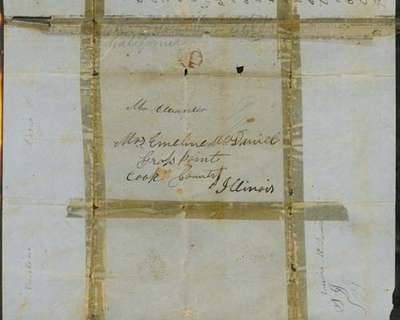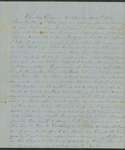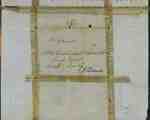Address page: When you write direct your letter to Sacramento City, California [in pencil]
Mr. Alexander [to]
Mrs. Emeline McDaniel
Gross Point
Cook County
Illinois
[p.1] Georgetown August 1st 1850
Dear Emeline We arrived safe in the mines at
noon today all well. We left Salt Lake June
twenty-sixth. We had plenty of good grass and water
until we got on the maryes [Marys] River about three
hundred miles from Salt Lake, and for the next
three hundred miles we could scarcely get grass enough
too [to] keep the animals alive. The river bottom was all
overflowed with water, and the grass all used up on
the side we traveled so that we had to cross the river
in a boat box [?] to get what little we had and made
sloughs and cut the grass with a butcher knife
a handful in a place just as we could find it.
I have stood in the water and tolerated [?] mud knee
deep until ten o'clock night after night and then lay
down on the ground in my wet clothes untill [until]
morning. Next we came to the marsh or meadow
ten miles from the desert there is plenty of good grass
at le[a]st ten thousand acres. We stayed there two
days and made hay to feed crossing the dessert.
We took the north road on the desert. That is the
truckey [Truckee] River road. We started in at four o'clock
in the afternoon and got through at nine
o'clock the next morning. We had no dif[f]iculty in
crossing. It is said to be for[t]y-five miles. We intended
following the truckey [Truckee] Road in the mines but the
[p.2] river was so high that we could not cross
it as we had to cross twenty-eight times in going
thirty miles. Consequently we had to cross over on the
other road again which was about fifteen miles.
The greatest destruction of property that I ever saw was
between the head of maryes [Marys] river and the foot of the
Sier[r]a Nevada Mountains. Tens of thousands of dollars worth of
wagons, harnesses, clothing, and bed clothing was s[t]rewed almost
every mile on the road and dead horses by the thousands,
and men that have lost their teams and provisings [provisions] all
gone and forced to begg [beg] their way from one wagon to
another. We have fed a great many along. Some two days
at a time. There was two men that came so near
Starving to death on the desert that they cut their throats
to put an end to their Suffering. We got along verry [very] well
for provisings. We had plenty of bread. Stuff that we got at
the bluffs to last us through. We bought bacon on the
road from one dollar to one fifty a pound, fresh beef
for forty c[en]ts, tea four dollars @ lb., dry apples we
paid ten dollars a bushel and some other things in
proporting [proportion]. We should have started with enough if
it had not of been for some that had been through
last year. They said we had enough and more too,
but I am safe, though, and money left.
The Lord only knows what the thousands will do that
are behind us for we were ahead of at least
two thirds of the emigration, and we could scarcely
get grass enough to keep our horses alive. The Indians
Stole a great many horses and shot one man on the
[p.3] head waters of Maryes [Marys] River with an arrow. He was a
watching his horses at the time in the night. His name
was Samuel Oliver. He belongs 24 miles west of
Milwaukee. It was the second of July. Some of our boys
saw him just before he died. We saw Hazard Rabbiure [?]
and Emerson east of the Sierra Nevada Mountains, all
well. Ace Patterson is with us. Jealerson [?] and John Faster
left us nine days ago to cross the mountain and we
stopped [?] and prospected three days the east side of the
mountain. There is said to be gold there, but we found
none. We left our waggon [wagon] east side of the mountain
and took a pack trail over that. Saved forty miles
travel. We heard by one that we could depend on that.
Horses were worth nothing in the mines. So I sold [them]
for twenty-five dollars, and walked over the mountain
and packed my stuff on my mule the roughest road
that I ever saw. It took us five days to go one hundred
miles. I have just now sold my mule for seventy
dollars. I dug and washed a pan full of dirt within a rod
of where I am sitting, and got a shillings worth of gold.
Paterson's got a lump in the same [illegible] worth five dollars.
People say the prospects are verry [very] bad here, but I can't
tell yet. Provisions are reasonable. Flour twenty c[en]ts a lb.,
and other things in proportion. Horse feed is high. Hay is worth
300 dollars a ton, barley 14 dollars a bushel. You will hear from
me as often as convenient. I never felt better than I
have ever since I left home. Give my respects
to all my relatives and other enquiring friends. I still remain
your affectionate husband until Death. A[lexander] McDaniel
Letter from Alexander McDaniel to Emeline McDaniel August 1, 1850
Description
- Creators
- McDaniel, Alexander, 1815-1898, Correspondent
- McDaniel, Emeline C. Huntoon, 1824-1902, Recipient
- Media Type
- Text
- Image
- Item Type
- Correspondence
- Description
- Letter from Alexander McDaniel, Georgetown, California, to his wife, Emeline McDaniel, Gross Point, Cook County, Illinois, dated August 1, 1850. Description of his travels to California and experiences prospecting for gold.
- Date of Original
- 1 Aug 1850
- Subject(s)
- Local identifier
- Document 1
- Language of Item
- English
- Geographic Coverage
-
-
California, United States
Latitude: 38.90684 Longitude: -120.83855
-
- Copyright Statement
- Public domain: Copyright has expired according to United States law. No restrictions on use.
- Contact
- Wilmette Public LibraryEmail:refdesk@wilmettelibrary.info
Website:
Agency street/mail address:1242 Wilmette Avenue
Wilmette, IL
60091-2558
U.S.A. Phone: 847-256-6930 - Full Text





